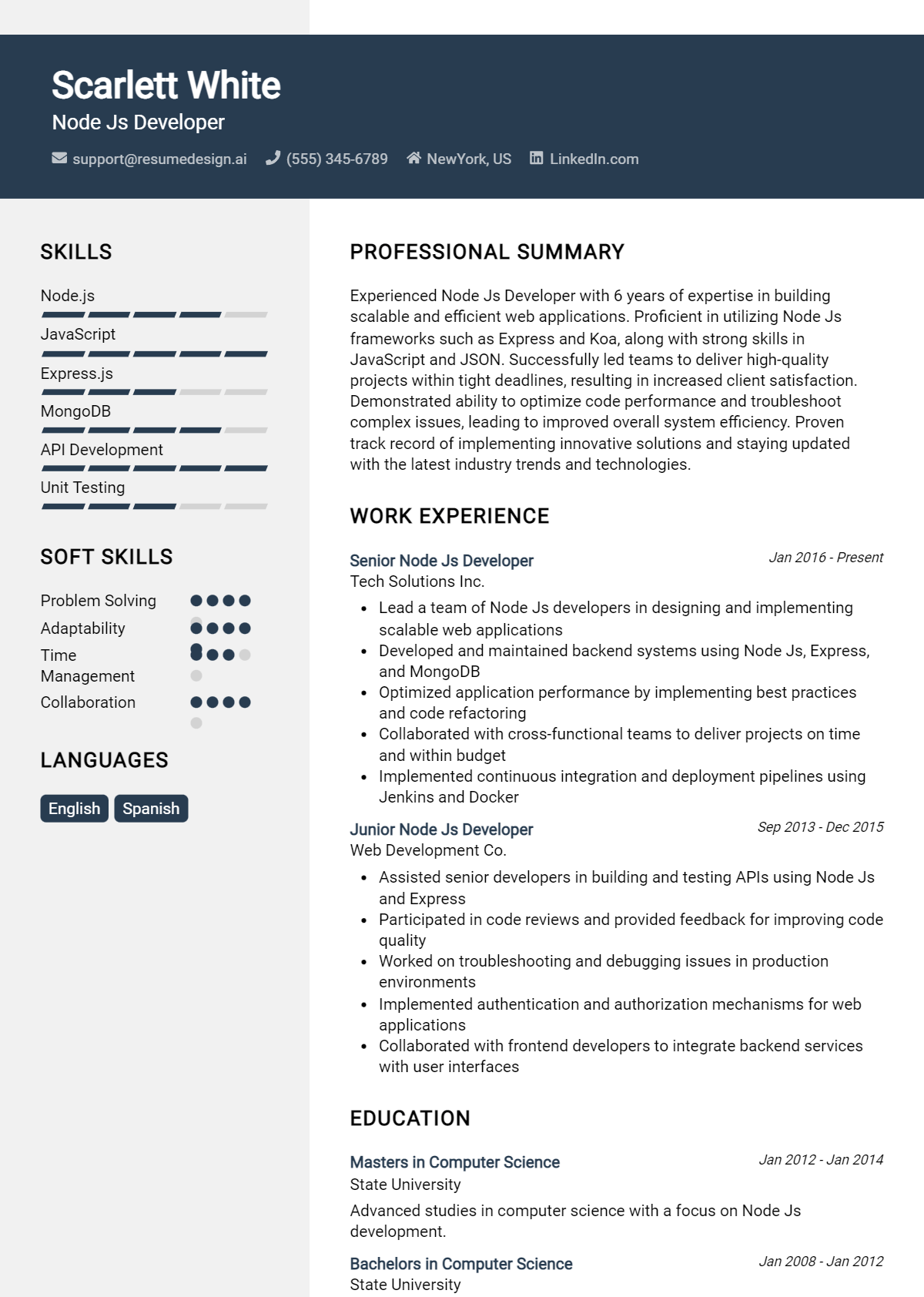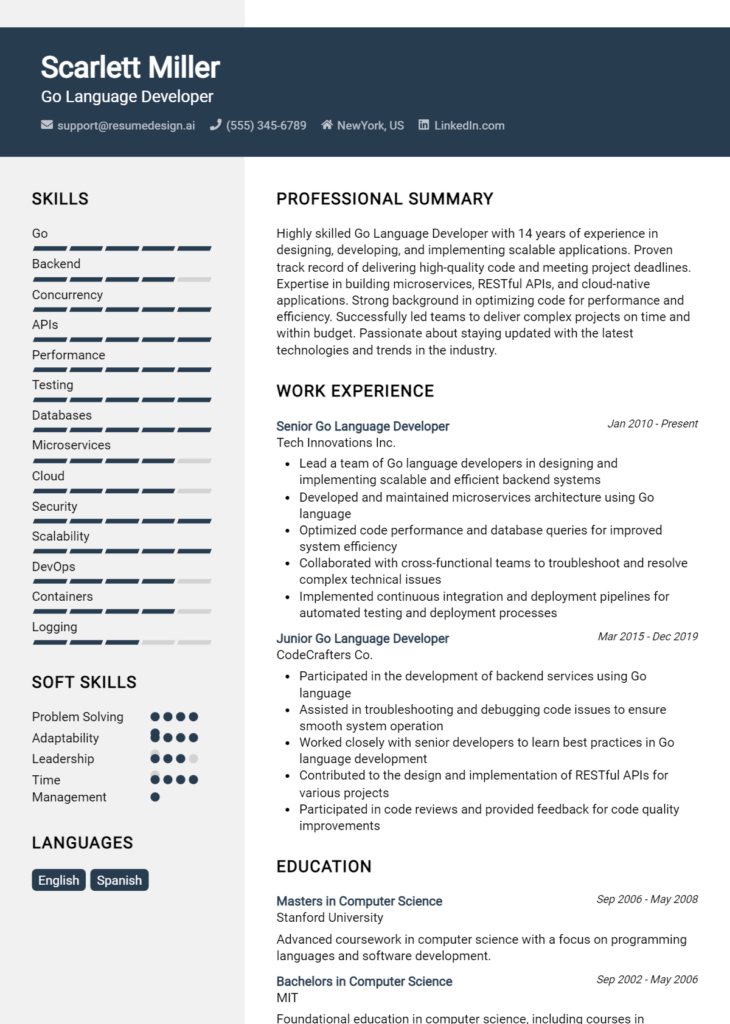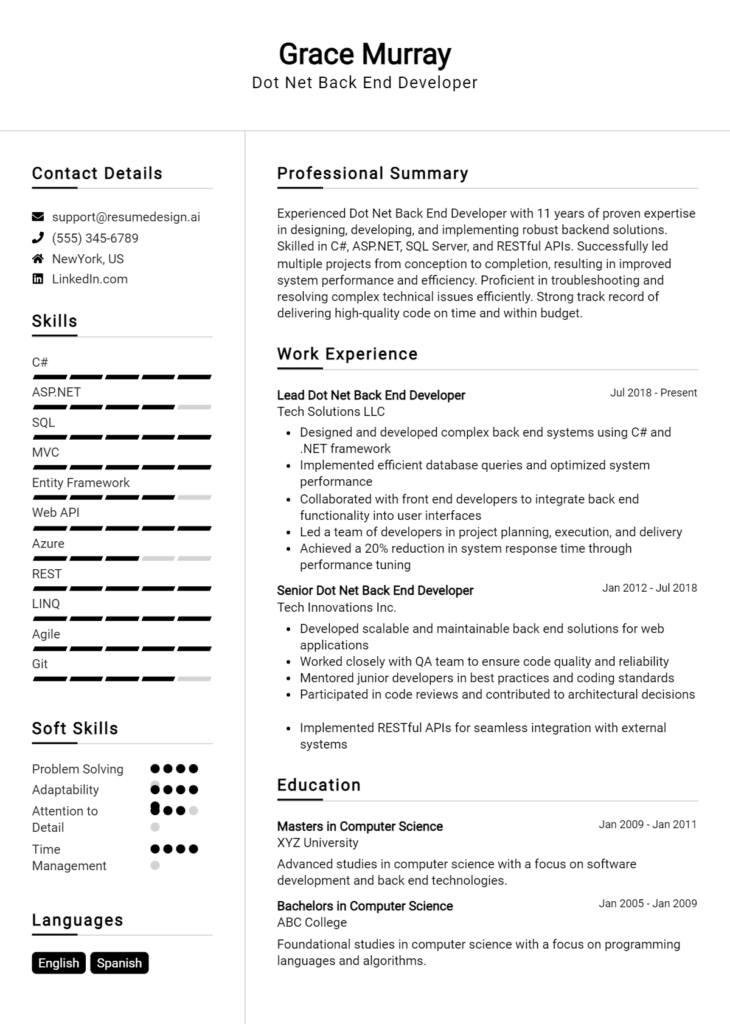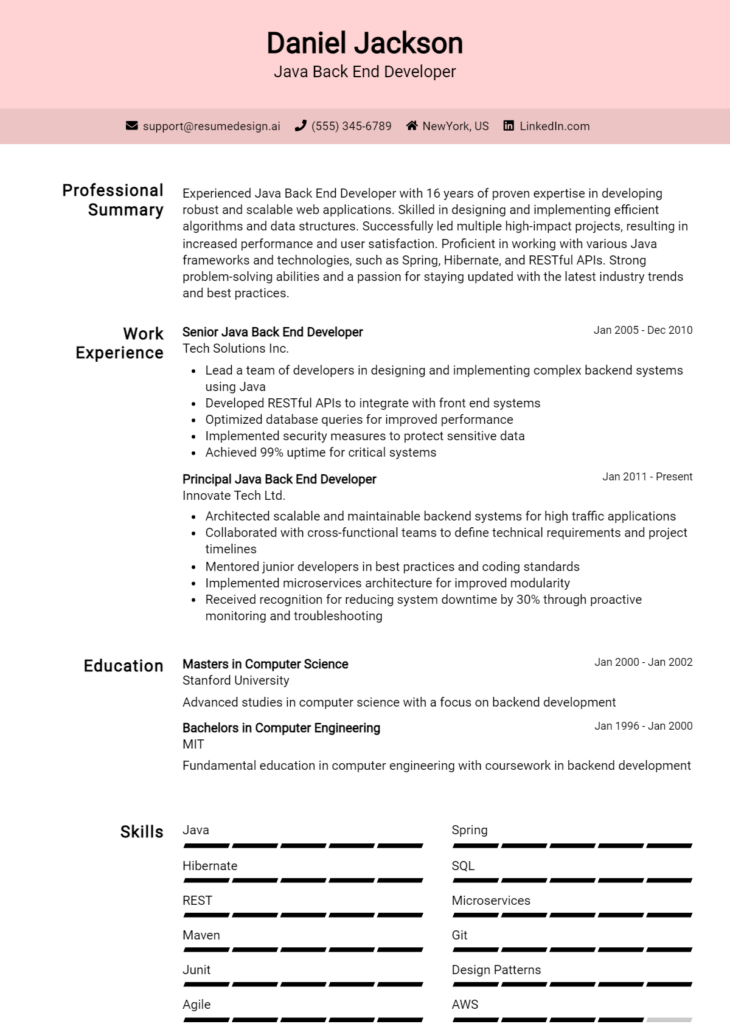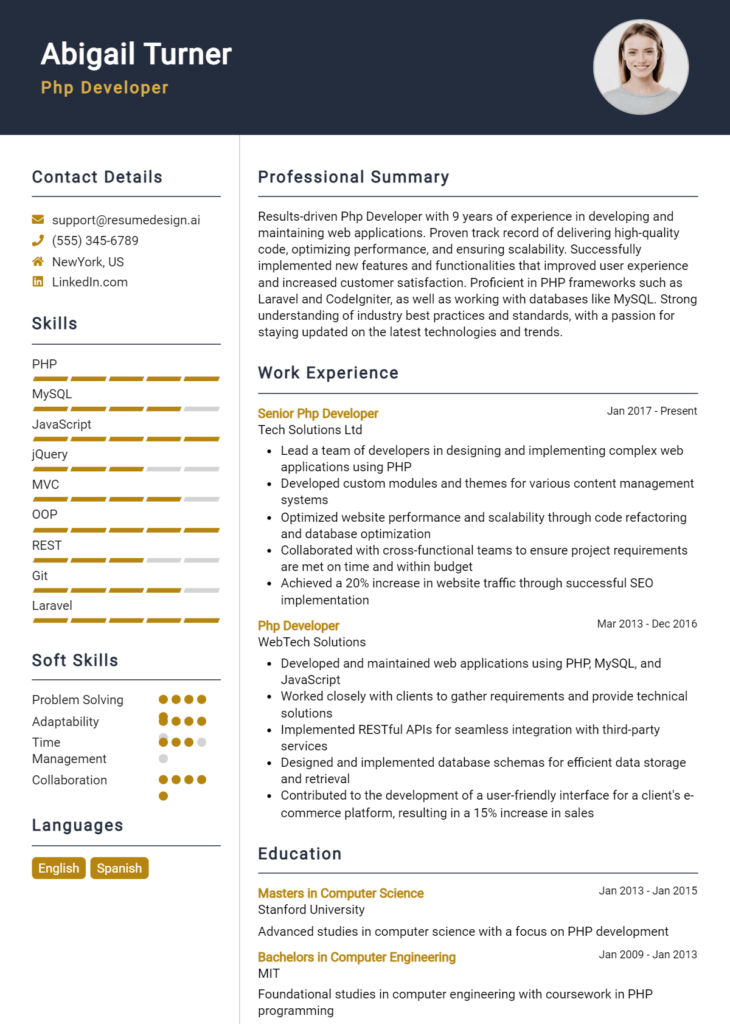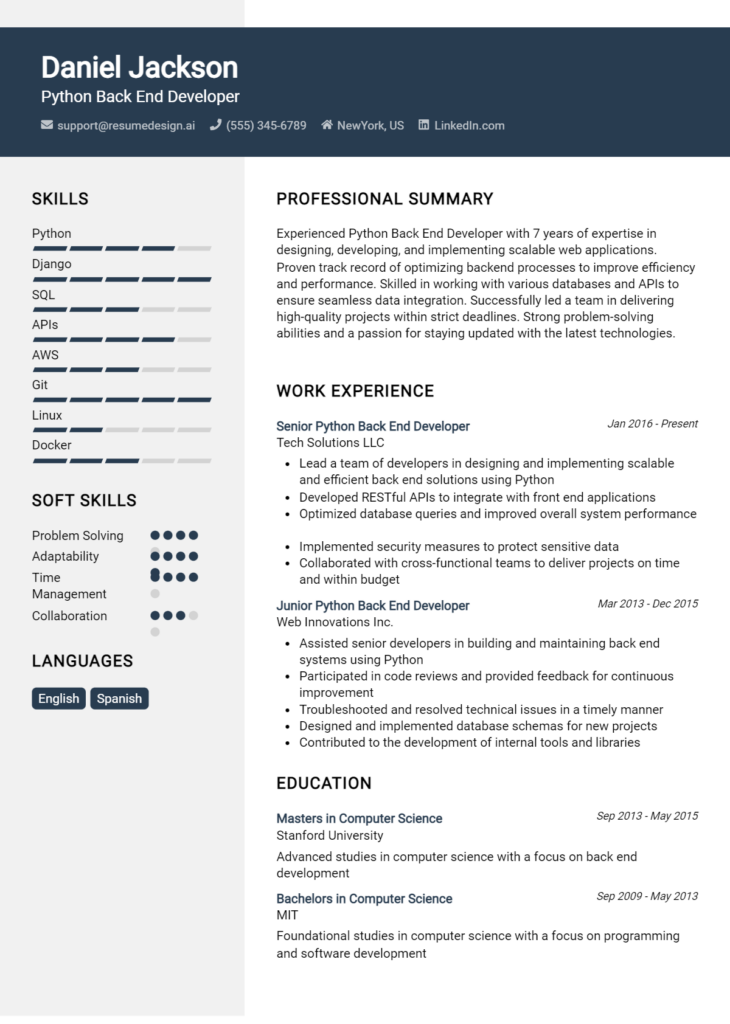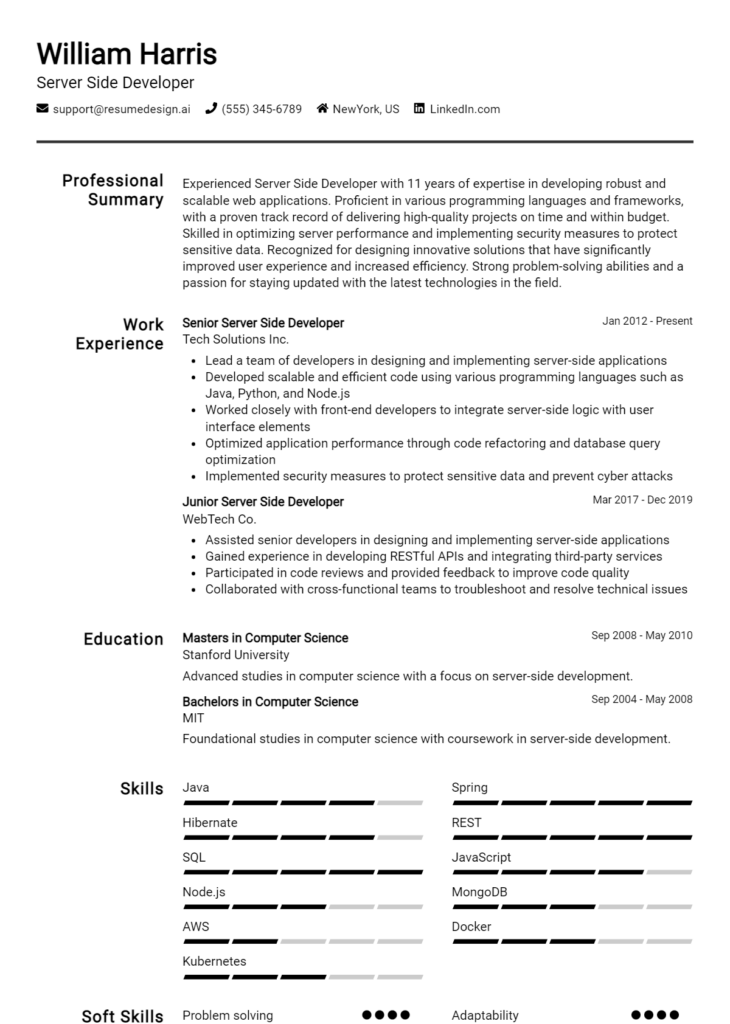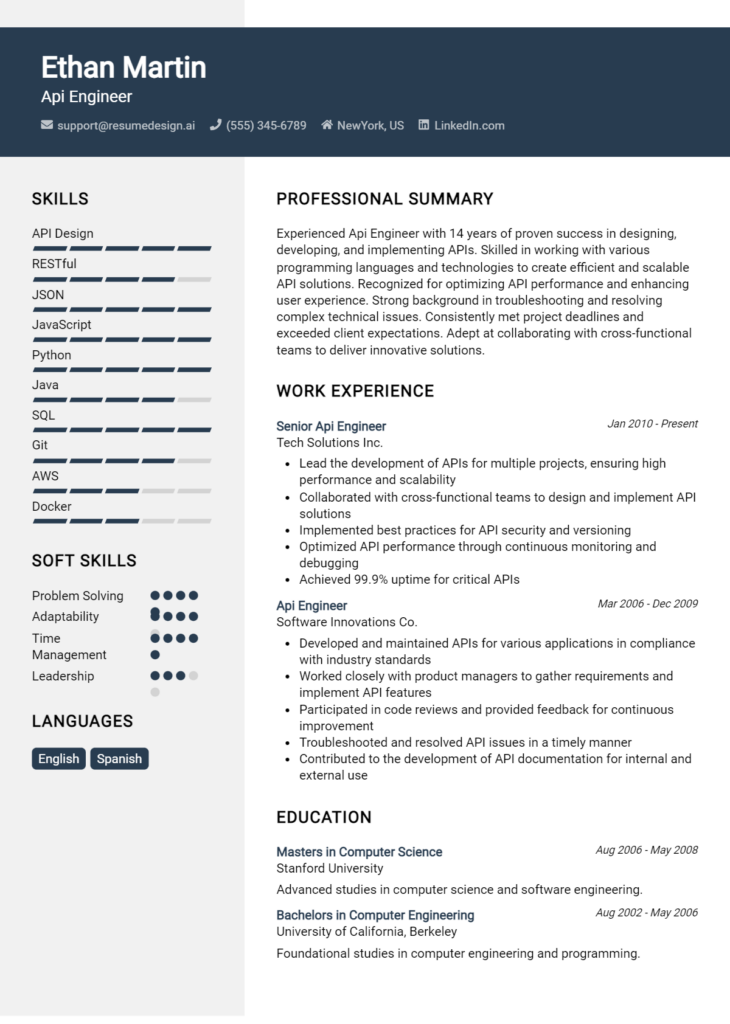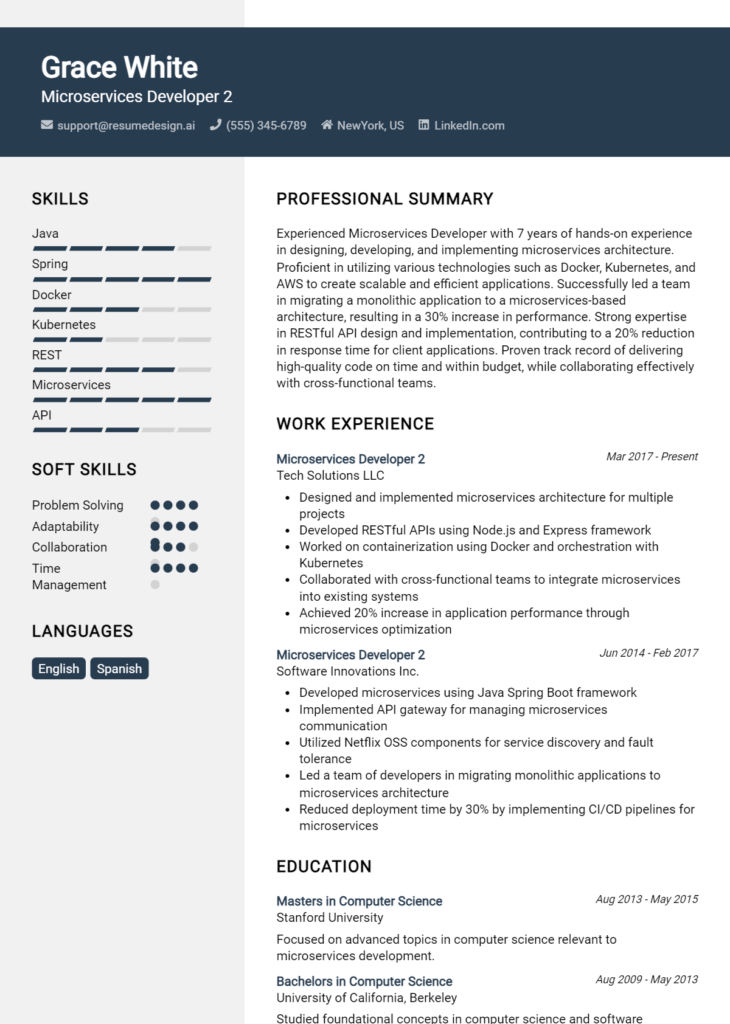Node.js Developer Core Responsibilities
A Node.js Developer plays a pivotal role in bridging various departments by architecting scalable applications and enhancing server-side logic. Key responsibilities include developing APIs, integrating databases, and optimizing application performance. Essential skills encompass strong technical proficiency in JavaScript, operational awareness for deployment processes, and advanced problem-solving abilities to troubleshoot issues efficiently. By effectively showcasing these qualifications on a well-structured resume, developers can demonstrate their vital contribution to an organization’s overall goals and objectives.
Common Responsibilities Listed on Node.js Developer Resume
- Developing and maintaining server-side applications using Node.js.
- Creating RESTful APIs to support front-end functionality.
- Integrating user-facing elements with server-side logic.
- Designing and implementing database schemas and data storage solutions.
- Optimizing applications for maximum speed and scalability.
- Collaborating with front-end developers to integrate user-facing elements.
- Conducting code reviews and providing constructive feedback.
- Debugging and troubleshooting application issues.
- Participating in Agile development processes and sprint planning.
- Documenting application processes and maintaining code quality standards.
- Staying updated with emerging technologies and industry trends.
High-Level Resume Tips for Node.js Developer Professionals
In the competitive landscape of technology careers, a well-crafted resume serves as the first handshake between a Node.js Developer and a potential employer. It's critical for candidates to understand that their resume is more than just a list of past jobs; it should be a strategic marketing tool that effectively showcases their skills and achievements. A strong resume not only highlights technical proficiencies but also tells the story of a developer’s journey, emphasizing problem-solving capabilities and innovative contributions. This guide will provide practical and actionable resume tips specifically tailored for Node.js Developer professionals, ensuring that you make a lasting impression on hiring managers.
Top Resume Tips for Node.js Developer Professionals
- Customize your resume for each job application by incorporating keywords and phrases from the job description.
- Focus on showcasing relevant experience, particularly projects and roles that involve Node.js and associated technologies.
- Quantify your achievements where possible, such as by stating “Improved API response time by 30%” to illustrate your impact.
- Highlight industry-specific skills such as proficiency in JavaScript, Express.js, MongoDB, and RESTful API development.
- Include a summary section at the top that outlines your career goals and key competencies related to Node.js development.
- Showcase any contributions to open-source projects or personal projects that demonstrate your passion and expertise in Node.js.
- Utilize a clean and professional layout that emphasizes readability and organization, making it easy for hiring managers to find key information.
- Incorporate relevant certifications or training that enhance your qualifications, such as courses in modern JavaScript frameworks or cloud services.
- Be mindful of including soft skills that are essential for developers, such as teamwork, communication, and adaptability.
By implementing these tips, Node.js Developer professionals can significantly increase their chances of landing a job in the field. A tailored and well-organized resume not only showcases technical expertise but also demonstrates a proactive approach to career advancement, making you a more attractive candidate in the eyes of potential employers.
Why Resume Headlines & Titles are Important for Node.js Developer
In the competitive landscape of job applications, the resume headline or title serves as the first impression a Node.js Developer makes on hiring managers. A strong headline can instantly capture attention and succinctly summarize a candidate's most relevant qualifications, ensuring that their resume stands out among many. An effective title should be concise, relevant, and directly aligned with the job being applied for, setting the tone for the rest of the resume and enticing employers to learn more about the candidate's skills and experiences.
Best Practices for Crafting Resume Headlines for Node.js Developer
- Keep it concise: Aim for a maximum of 10-12 words.
- Make it role-specific: Include "Node.js Developer" to clarify your focus.
- Highlight key skills: Mention core technologies such as JavaScript, Express, or MongoDB.
- Showcase experience: If applicable, include years of experience or notable projects.
- Use action-oriented language: Start with strong verbs that convey your expertise.
- Be unique: Personalize your headline to differentiate yourself from other candidates.
- Include relevant certifications: If you have certifications, mention them in your title.
- Tailor for the job: Customize your headline for each position you apply to.
Example Resume Headlines for Node.js Developer
Strong Resume Headlines
"Experienced Node.js Developer Specializing in Scalable Web Applications"
“Full-Stack Developer with 5+ Years in Node.js and Microservices Architecture”
“Node.js Developer with a Proven Track Record in Agile Development and API Integration”
Weak Resume Headlines
“Developer Looking for a Job”
“Node.js Programmer”
Strong headlines are effective because they are specific, highlighting relevant skills and experiences that align with the job description. They convey confidence and demonstrate a candidate's ability to contribute meaningfully to a potential employer. In contrast, weak headlines fail to impress due to their vagueness and lack of detail, leaving hiring managers unsure about the applicant's qualifications and suitability for the role. By avoiding generic phrases and focusing on impactful, descriptive language, candidates can significantly enhance their chances of making a positive first impression.
Writing an Exceptional Node.js Developer Resume Summary
In the competitive landscape of technology careers, a well-crafted resume summary is crucial for a Node.js Developer. This concise introduction acts as a hook, quickly capturing the attention of hiring managers by highlighting key skills, relevant experience, and noteworthy accomplishments that align with the job role. A strong summary not only showcases a candidate's proficiency in Node.js and associated technologies but also sets the tone for the rest of the resume. To be effective, it should be concise, impactful, and tailored to the specific requirements of the position being applied for, ensuring that the candidate stands out in a sea of applicants.
Best Practices for Writing a Node.js Developer Resume Summary
- Quantify achievements whenever possible to demonstrate impact.
- Focus on relevant skills specific to Node.js and the technologies used.
- Tailor the summary to match the job description, using keywords from the posting.
- Keep it concise, ideally within 2-4 sentences, to maintain clarity.
- Highlight specific accomplishments that showcase problem-solving abilities.
- Include any relevant certifications or training that add credibility.
- Use strong action verbs to convey proactivity and expertise.
- Avoid generic phrasing; personalize the summary for each application.
Example Node.js Developer Resume Summaries
Strong Resume Summaries
Dynamic Node.js Developer with over 5 years of experience in building scalable web applications. Successfully led a team that improved application performance by 30%, utilizing Express.js and MongoDB to enhance user experience.
Results-driven Node.js Developer with a track record of deploying high-traffic applications. Developed an API that processed over 1 million requests per day, reducing latency by 25% through optimized coding practices.
Innovative Node.js Developer skilled in microservices architecture and cloud deployment. Spearheaded a project that integrated third-party services, resulting in a 40% increase in operational efficiency.
Weak Resume Summaries
Node.js Developer with experience in various projects. I like to work in teams and contribute to software development.
Enthusiastic developer familiar with Node.js and web technologies. Looking for opportunities to grow in a tech company.
The strong resume summaries effectively highlight specific achievements and skills, demonstrating the candidate's value and relevance to the Node.js Developer role. They include quantifiable outcomes and direct references to the technologies used, which makes them compelling. In contrast, the weak summaries lack specificity and measurable results, making them appear generic and less impactful, which can hinder a candidate's chances of making a strong impression on hiring managers.
Work Experience Section for Node.js Developer Resume
The work experience section of a Node.js Developer resume is crucial as it serves as a reflection of the candidate's technical skills, team management abilities, and product delivery capabilities. This section not only highlights the specific technologies and frameworks used but also showcases the candidate's role in driving projects to successful completion. By quantifying achievements—such as improved performance metrics, successful project launches, or contributions to team efficiency—candidates can demonstrate their impact in previous roles. Aligning work experience with industry standards further enhances credibility and ensures that the candidate stands out in a competitive job market.
Best Practices for Node.js Developer Work Experience
- Use action verbs to start each bullet point, emphasizing proactive contributions.
- Quantify your accomplishments with metrics (e.g., "Reduced application load time by 30%").
- Highlight specific technologies and frameworks used, showcasing technical expertise.
- Describe your role in team projects, focusing on collaboration and leadership.
- Tailor your experience to align with the job description, emphasizing relevant skills.
- Include challenges faced and how you overcame them to demonstrate problem-solving skills.
- Focus on the impact of your work on the business or team, linking it to organizational goals.
- Keep descriptions concise and focused, ensuring clarity and readability.
Example Work Experiences for Node.js Developer
Strong Experiences
- Led a team of 5 developers in the successful migration of a legacy application to a Node.js microservices architecture, resulting in a 40% increase in system scalability.
- Implemented a RESTful API for a high-traffic e-commerce platform, improving response times by 25% and enhancing user experience.
- Optimized database queries in a Node.js application, decreasing load times by 50% and increasing overall application efficiency.
- Collaborated with cross-functional teams to deliver a new feature set within deadlines, achieving a customer satisfaction score of 95% post-launch.
Weak Experiences
- Worked on various Node.js projects without specifying roles or outcomes.
- Assisted in coding tasks that contributed to the team.
- Helped maintain existing applications.
- Participated in team meetings and contributed to discussions.
The examples listed as strong highlight specific achievements and quantifiable results, showcasing the candidate's technical leadership and collaborative efforts. In contrast, the weak experiences lack detail and fail to convey any significant impact, making them less compelling to potential employers. Strong experiences demonstrate not only what the candidate did but also the value they brought to their previous roles, while weak experiences are vague and do not clearly articulate the candidate's contributions or successes.
Education and Certifications Section for Node.js Developer Resume
The education and certifications section of a Node.js Developer resume plays a crucial role in showcasing the candidate's academic background, relevant industry certifications, and commitment to continuous learning. This section provides potential employers with a clear understanding of the candidate's foundational knowledge and specialized skills that align with the demands of the job. By including relevant coursework, certifications, and any specialized training, candidates can significantly enhance their credibility, demonstrating their preparedness for the challenges of a Node.js Developer role and their dedication to staying updated in a rapidly evolving field.
Best Practices for Node.js Developer Education and Certifications
- Prioritize relevant degrees and certifications that align with Node.js development.
- Include specific coursework that demonstrates technical skills and knowledge in JavaScript, backend development, and databases.
- Highlight industry-recognized certifications, such as Node.js Certified Developer, to establish credibility.
- Detail any specialized training in related frameworks or tools, such as Express.js or MongoDB.
- Use clear language and avoid jargon to ensure readability and understanding.
- Keep the section concise while providing enough detail to demonstrate expertise.
- Update this section regularly to reflect new certifications or relevant educational achievements.
- Consider including online courses or bootcamps that are widely recognized in the tech community.
Example Education and Certifications for Node.js Developer
Strong Examples
- Bachelor of Science in Computer Science, University of Technology - Graduated 2022
- Node.js Certified Developer, Node.js Foundation - Issued July 2023
- Full-Stack JavaScript Bootcamp, Tech Academy - Completed January 2023
- Advanced JavaScript and Node.js Programming, Coursera - Completed June 2023
Weak Examples
- Associate Degree in General Studies, Community College - Graduated 2020
- Certification in Microsoft Office Suite - Completed 2019
- High School Diploma - Graduated 2018
- Outdated Java Programming Certificate, Online Learning Portal - Issued 2015
The strong examples are considered effective because they directly relate to the skills and knowledge required for a Node.js Developer role, showcasing relevant degrees, recent certifications, and specialized training. In contrast, the weak examples lack relevance to the position, either by being outdated, too general, or not aligned with the technical competencies required for a Node.js developer, ultimately failing to bolster the candidate's qualifications.
Top Skills & Keywords for Node.js Developer Resume
In today's competitive job market, having a well-crafted resume is essential for Node.js Developers looking to stand out from the crowd. The skills presented on your resume not only reflect your technical proficiency but also showcase your ability to collaborate and communicate effectively within a team. Employers often seek candidates who possess a balanced mix of hard and soft skills, as this combination can significantly influence project outcomes and team dynamics. Therefore, highlighting the right skills on your resume can greatly enhance your chances of landing an interview and ultimately securing a job.
Top Hard & Soft Skills for Node.js Developer
Soft Skills
- Excellent communication skills
- Team collaboration
- Problem-solving abilities
- Time management
- Adaptability
- Critical thinking
- Attention to detail
- Creativity
- Empathy
- Leadership potential
Hard Skills
- Proficiency in Node.js and JavaScript
- Experience with RESTful APIs
- Knowledge of Express.js framework
- Familiarity with databases (MongoDB, SQL)
- Understanding of asynchronous programming
- Version control systems (Git)
- Unit testing and debugging skills
- Cloud services (AWS, Azure)
- Familiarity with front-end technologies (HTML, CSS, React)
- Understanding of microservices architecture
Incorporating these skills into your resume can significantly enhance your profile. Additionally, highlighting relevant work experience that demonstrates these abilities will further strengthen your candidacy for a Node.js Developer position.
Stand Out with a Winning Node.js Developer Cover Letter
Dear [Hiring Manager's Name],
I am writing to express my interest in the Node.js Developer position at [Company Name], as advertised on [where you found the job posting]. With a solid background in JavaScript and extensive experience in building scalable server-side applications using Node.js, I am excited about the opportunity to contribute to your dynamic team. My hands-on expertise with frameworks such as Express.js and my commitment to delivering high-quality code align perfectly with the innovative projects at [Company Name].
In my previous role at [Your Last Company], I successfully developed and maintained a range of applications that improved the efficiency of our operational processes by 30%. I utilized Node.js to create RESTful APIs, ensuring seamless data exchange between the server and client-side applications. My collaborative approach allowed me to work closely with front-end developers, enhancing the user experience while maintaining optimal server performance. Additionally, my experience with MongoDB and other NoSQL databases has equipped me with the skills necessary to implement robust data storage solutions.
I am particularly drawn to [Company Name] because of its commitment to [specific aspect of the company or its projects, e.g., innovation, community impact, etc.]. I believe that my proactive mindset and problem-solving skills will allow me to contribute effectively to your projects. I am eager to bring my passion for technology and my ability to adapt to new challenges to your team, ensuring that we deliver outstanding results.
Thank you for considering my application. I look forward to the opportunity to discuss how my skills and experiences can contribute to the success of [Company Name]. Please feel free to reach out to schedule a conversation at your earliest convenience.
Sincerely,
[Your Name]
[Your LinkedIn Profile or Portfolio URL]
[Your Contact Information]
Common Mistakes to Avoid in a Node.js Developer Resume
When crafting a resume as a Node.js Developer, it's crucial to present your skills and experience effectively to stand out in a competitive job market. However, many candidates make common mistakes that can hinder their chances of landing an interview. By being aware of these pitfalls, you can tailor your resume to highlight your strengths and avoid potential red flags. Here are some common mistakes to watch out for:
Lack of Specificity: Failing to provide specific examples of your work with Node.js can make your resume vague. Include details about projects, technologies used, and your specific contributions to demonstrate your expertise.
Ignoring Keywords: Many companies use Applicant Tracking Systems (ATS) to filter resumes. Not incorporating relevant keywords from the job description can lead to your resume being overlooked. Tailor your resume to include terminology that matches the role you are applying for.
Overloading with Technical Jargon: While it’s important to showcase your technical skills, using excessive jargon can confuse hiring managers who may not have a technical background. Aim for a balance between technical details and clear communication.
Neglecting Soft Skills: Focusing solely on technical abilities and neglecting soft skills like teamwork, communication, and problem-solving can be detrimental. Employers look for well-rounded candidates, so be sure to highlight these skills as well.
Using a Generic Template: Submitting a one-size-fits-all resume can make you appear unprofessional or uninterested. Customize your resume for each application to reflect the specific requirements and culture of the company.
Omitting Relevant Projects: If you have worked on significant personal or open-source projects, don’t forget to include them. These can demonstrate your passion for development and ability to apply your skills outside of formal employment.
Focusing on Responsibilities Instead of Achievements: Listing job duties without highlighting your accomplishments can make your experience seem less impressive. Use metrics and results to show how your work positively impacted previous employers.
Poor Formatting: A cluttered or difficult-to-read resume can turn off potential employers. Use clear headings, bullet points, and consistent formatting to ensure your resume is visually appealing and easy to navigate.
Conclusion
As a Node.js Developer, it is crucial to stay updated with the latest technologies and trends in the JavaScript ecosystem. Throughout this article, we explored the essential skills required for a Node.js Developer, including proficiency in asynchronous programming, understanding of RESTful APIs, and experience with databases like MongoDB or PostgreSQL. We also highlighted the importance of version control systems like Git and the need for familiarity with deployment processes and cloud services.
Furthermore, we discussed the significance of soft skills such as problem-solving and effective communication, which are vital in collaborative environments. As the demand for Node.js Developers continues to grow, having a well-crafted resume is essential to stand out in a competitive job market.
Now is the perfect time to review and enhance your Node.js Developer resume. Utilize resources like resume templates to create a visually appealing layout, or try out the resume builder for a guided approach to structuring your information. For inspiration, check out the resume examples tailored for tech professionals, and don't forget to complement your resume with a strong application by using our cover letter templates. Take action today and elevate your chances of landing your dream job!

